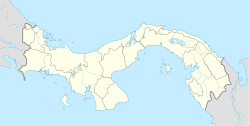Burunga facts for kids
Quick facts for kids
Burunga
|
|
|---|---|
|
Corregimiento
|
|
| Country | |
| Province | Panamá Oeste |
| District | Arraiján |
| Established | April 30, 2003 |
| Area | |
| • Land | 52.4 km2 (20.2 sq mi) |
| Population
(2010)
|
|
| • Total | 39,102 |
| • Density | 745.7/km2 (1,931/sq mi) |
| Population density calculated based on land area. | |
| Time zone | UTC−5 (EST) |
Burunga is a special kind of local area in Panama. It's called a corregimiento. Think of it like a small town or a part of a bigger city.
Burunga is located in the Arraiján District, which is part of the Panamá Oeste Province. This province is in the country of Panama.
In 2010, about 39,102 people lived in Burunga. It was officially created on April 30, 2003, by a special law (Law 42).
Contents
What is a Corregimiento?
A corregimiento is a type of administrative division in Panama. It's like a local government area. These areas help organize the country. They make sure that local services are provided.
How Corregimientos Work
Each corregimiento has its own local leader. This leader helps manage the area. They work on things like public services and community projects. It helps keep things organized for the people living there.
Where is Burunga Located?
Burunga is in the western part of Panama. It's close to the country's capital, Panama City. This area is known for its growing communities.
Geography of Burunga
Burunga covers an area of about 52.4 square kilometers. That's about 20 square miles. This size helps determine how many people can live there comfortably. The population density is about 745.7 people per square kilometer. This means many people live in a smaller space.
History of Burunga
Burunga is a relatively new corregimiento. It was officially established in 2003. Before that, it might have been part of a larger area. Creating new corregimientos helps manage growing populations. It also helps provide better local services to communities.
Why New Corregimientos Are Created
When a population grows, new local divisions are often needed. This helps local governments serve people better. It means services like schools, roads, and public safety can be managed more closely.
See also
 In Spanish: Burunga para niños
In Spanish: Burunga para niños
 | Kyle Baker |
 | Joseph Yoakum |
 | Laura Wheeler Waring |
 | Henry Ossawa Tanner |


